Opinion

Phyllis Tickle predicted that it would take us — as it has taken others elsewhere — one hundred years to shake it all out once more, to find a new normal as humans, as Christians, as people who are relearning how to love and recognize the image of God in one another. And if this is true, then we are still merely at the beginning of this epoch, marked by the rise of global internet access. We are in the "chaos" phase that every artist knows well, where the supplies are strewn about and the grief that is to be our painting’s subject has yet to be fully deconstructed. To me, there is hope in this reminder — hope that maybe we have been created to live in the muddled period of becoming, committing ourselves to trial and error and to sifting.

Women are showing that, despite being subject to the most violent and forceful manifestations of our patriarchal society and culture, they are willing to stand up in defiance and in solidarity to ensure that we as a society no longer allow incidents of sexual harassment and violence to go unchallenged, unnoticed, and unbelieved. And almost certainly, many other women who have experienced harassment or assault have decided understandably not to speak out. “Survivors don’t owe us their stories” explained Alexis Benveniste on twitter.

1. Let’s start with this — if you are not a person who ethnically identifies as black (truly black — please miss me entirely with any Rachel Dolezal references), you cannot use the N-word. Not in a song. Not ever. I am not going to apologize for this. I am not going to engage in conversations about “rights” as it relates to freedom of speech. You do not have the right to comment on how this word is used by black people within the black community. This word has been bought and paid for through the hundreds of thousands of bodies/lives. I fully recognize that entitlement doesn’t ever want to be told what it can and cannot hold. But entitlement has blood on its hands that it has not yet truly begun to atone for, so I want to say this (and please hear me): This word does not belong to you.
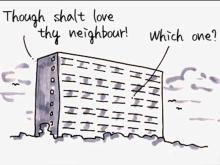
Yet this administration’s guidelines would allow businesses and government employees to pick and choose who they will serve. As a pastor, I have to ask: What religion champions spitting in people’s faces rather than turning the other cheek? How is God’s love shown through public humiliation, hate, or depriving LGBT people of a job or services?
9. My Book Is About Race. Of Course It Is.
“Now my world is still on fire, but people keep applauding my ability to describe the flames.”

When progress we have worked so hard to achieve is being reversed, we must work to strengthen the partnerships between and among the faith community, communities of color, the environmental policy community, and the grassroots climate justice movement. We need to rebuild, inspire, and resource an American majority that recognizes the reality of climate change and seeks to stop it. The environmental movement must be more open to climate justice concerns and faith perspectives. Faith communities of color must be mobilized to view combatting climate change and building resiliency to climate change effects as central to their missions. And the resolve of sympathetic white evangelicals and Catholics — especially young people — who support action on climate change must be strengthened.

Though politically important during key periods of American history, evangelicals on the left have lost much of the influence they wielded as abolitionists or as advocates for safe working conditions during the 19th century. The history of progressive evangelicals has been full of disappointments, notably declining as the “religious right” rose to prominence in the 1980s. These years ensured that in common parlance, “evangelical” is now a synonym for “conservative.” The continuing dominance of the “moral majority,” and the current nature of partisan politics in the U.S., ensures that Christians who are concerned about social justice issues are minimized in national debates.

As Father Richard McSorley of Georgetown University wrote years ago, “It’s a sin to build a nuclear weapon.” We once put that on a poster. Perhaps it’s time to put the poster back up.

Local sports teams can serve as a training ground for young leaders. Kaepernick, and others who have knelt, are not merely using their platform for a political message — they are trying to tell us something about who they are and what they’ve gone through to get there.
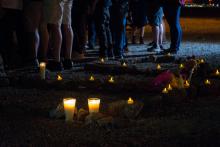
But white America must begin to tell the truth. The first truth that must be told: When white American men with guns murder large numbers of civilians for political or social purposes, they are terrorists. Not a “lone wolf,” not “troubled,” not “a good guy,” and not “someone/something never saw this coming.”

"Especially in this day and age, we already are living in tough times…I’ve seen people looking to things like film and television as a means of escape, so I have to acknowledge that people are spending their hard-earned money to go to a movie on a Friday night and want some sort of escape....My hope is that along with getting that escape, they will be positively motivated," says the filmmaker.
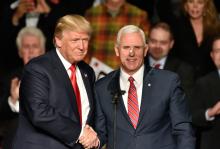
Mike Pence is following President Trump, but he is utterly failing at following Jesus.
Mike Pence’s actions during the football game had nothing to do with the love and justice Jesus calls his followers to strive for.

The conversation isn’t just about guns, although that’s certainly a huge part of it. We need to look at the bigger picture of how we’ve made violence our norm, how we endorse and encourage it in so many ways.
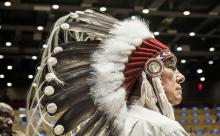
So we need to at least have the conversation, and for children who are home from school for the “holiday,” we should encourage families to talk honestly about what the history of Native peoples has looked like in the United States. We should be talking about what our history books are missing.
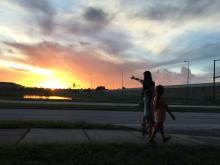
Orlando, Fla. is most known for the Walt Disney World theme parks that draw millions of visitors to the area each year. Yet few realize that the discount hotels they drive past on their way to the parks are occupied not by tourists, but by the homeless. They’re who The Florida Project director Sean Baker refers to as the “hidden homeless,” as they live, mostly unnoticed, at the fringes of the billion dollar resort. In The Florida Project, their stories find a platform.

There are two actions the president should take now to stop bureaucrats from obstructing assistance to genocide survivors whose very existence as a people teeters on a precipice.
1. How the Elderly Lose Their Rights
A heartbreaking report on how guardians can sell the assets and control the lives of senior citizens without their consent — and reap a profit from it.
2. FEMA Buried Updates on Puerto Rico. Here They Are.
“At some point this week, the Federal Emergency Management Agency removed information from its website documenting how much of the island of Puerto Rico still lacked power or access to drinking water. Instead, our Jenna Johnson reported, the federal agency was relaying only positive information, documenting how many federal workers were on the ground and the extent to which roads had been cleared.”

Nearly all of the characters K encounters (human and replicant alike) are white. This is in stark contrast to the globalized aesthetic of the city, carried over from the original movie. It could be argued that in a world where a white man like Leto’s Niander Wallace is the one person creating a sizable chunk of the population, it’s not surprising that the creations themselves lack diversity. However, the reality for the film’s casting decisions is likely less about artistic interpretation, and more just plain laziness.
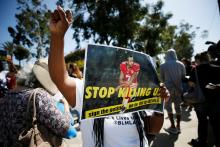
Yes, take a knee, indeed, and act in every way you can — in every venue in which you have influence — to participate in the slow, painstaking, uncomfortable, but absolutely urgent task of dismantling white supremacy.
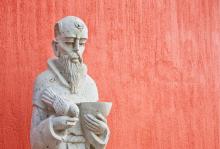
One day after celebrating the Feast of St. Fransis of Assisi, we are reminded that we need to hear the call Francis heard to repair Christ’s church. God has blessed the world today with some great leaders. Pope Francis has shown he truly understands the legacy of his namesake. He has chosen a simpler, less ostentatious lifestyle than previous Popes, and he has spoken out strongly for the poor and for peace. He is pointing the Church, Catholic and non-Catholic, in the right direction. But he can’t do it on his own. St. Francis didn’t. There were strong leaders in this era as well as their devoted followers. That’s what we need now. Reforming the American Church of today will take people who are willing to speak up for justice, both human and environmental. It will take people who will value a loving, dynamic fellowship over a stifled, silent one, afraid to “make waves”. It will take people ready to joyously and lovingly embody the values of Christ, as did Francis of Assisi.